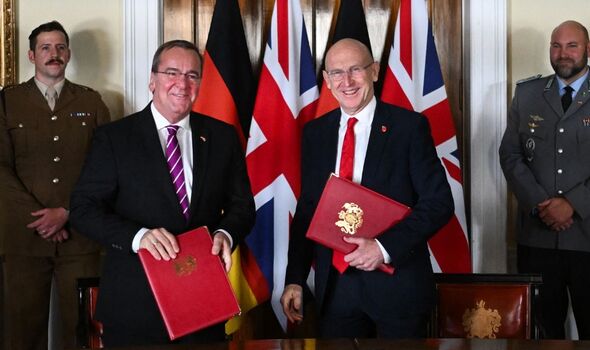The UK and Germany have signed a defence pact to strengthen their cooperation in the face of Russia‘s growing threat.
Under the agreement, German submarine-hunting planes will operate from RAF Lossiemouth in Scotland and arms giant Rheinmetall is set to open a factory that produces artillery gun barrels using British steel.
The UK-Germany Trinity House Agreement signifies the Government’s attempts to forge close relations with European allies, particularly on defence and security measures.
However, former defence secretary Sir Ben Wallace questioned its value, given Berlin’s continued refusal to send long-range Taurus missiles to Ukraine.
In a post on X, formerly Twitter, the former Tory Cabinet minister suggested the deal was more about deepening ties with the SPD, the German Chancellor‘s party.
“If the new UK/ German ‘Trinity House’ agreement is to mean anything then Germany would have agreed with UK requests to send Taurus to Ukraine AND they would lift any export veto on potential Typhoon sales to Turkey – a Nato member. Otherwise it is pretty hollow and made up of stuff we are already doing or had started.
“This has more to do with ‘SPD is our sister party’ than real military mutual benefit,” he claimed.
But UK Defence Secretary John Healey called it a “landmark agreement”, adding: “It secures unprecedented levels of new co-operation with the German armed forces and industry, bringing benefits to our shared security and prosperity, protecting our shared values and boosting our defence industrial bases.”
German defence minister Boris Pistorius said: “We must not take security in Europe for granted.
“Russia is waging war against Ukraine, it is increasing its weapons production immensely and has repeatedly launched hybrid attacks on our partners in eastern Europe.
“With the Trinity House Agreement, we are showing that the Nato allies have recognised what these times require and are determined to improve their deterrence and defence capabilities.”
Germany and Britain are the two largest military donors to Ukraine and have the second and third-highest defense budgets in NATO behind the US.
The pact will see Nato allies collaborating on developing long-range strike weapons with greater range than the UK’s existing Storm Shadow cruise missiles.
The UK and Germany will also work together to develop new drones, both land-based and aerial.
The Ministry of Defence (MOD) said German P-8 Poseidon maritime patrol aircraft will “periodically” operate out of Lossiemouth in Moray under the agreed terms, potentially armed with torpedoes supplied by the UK to help keep the North Atlantic secure.
London and Berlin will also collaborate to protect underwater cables amid the potential threat from Russian activity at sea.
Under the treaty, German firm Rheinmetall will construct a factory in the UK to make barrels for artillery guns. The UK government has yet to announce a site, but the MOD says it will use British steel produced by Sheffield Forgemasters and support over 400 jobs, as per BBC News.
The first artillery gun barrels will leave the production line in 2027.
In addition, the parties have agreed to cooperate on strengthening NATO’s eastern flank and providing further support for Kyiv as Russia‘s invasion, which began in February 2022, grinds on.
This will include work on equipping Germany’s Sea King helicopters with modern missile systems that Ukraine‘s armed forces can use.
